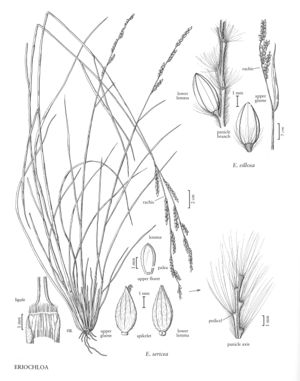Difference between revisions of "Eriochloa villosa"
FNA>Volume Importer |
imported>Volume Importer |
||
| (5 intermediate revisions by 2 users not shown) | |||
| Line 4: | Line 4: | ||
|publications= | |publications= | ||
|common_names=Ériochloé velue | |common_names=Ériochloé velue | ||
| + | |special_status={{Treatment/ID/Special_status | ||
| + | |code=I | ||
| + | |label=Introduced | ||
| + | }} | ||
|basionyms= | |basionyms= | ||
|synonyms={{Treatment/ID/Synonym | |synonyms={{Treatment/ID/Synonym | ||
|name=Paspalum villosum | |name=Paspalum villosum | ||
| − | |authority= | + | |authority= |
| + | |rank=species | ||
}} | }} | ||
|hierarchy=Poaceae;Poaceae subfam. Panicoideae;Poaceae tribe Paniceae;Eriochloa;Eriochloa villosa | |hierarchy=Poaceae;Poaceae subfam. Panicoideae;Poaceae tribe Paniceae;Eriochloa;Eriochloa villosa | ||
| Line 29: | Line 34: | ||
-->{{#Taxon: | -->{{#Taxon: | ||
name=Eriochloa villosa | name=Eriochloa villosa | ||
| − | |||
|authority=(Thunb.) Kunth | |authority=(Thunb.) Kunth | ||
|rank=species | |rank=species | ||
| Line 36: | Line 40: | ||
|basionyms= | |basionyms= | ||
|family=Poaceae | |family=Poaceae | ||
| + | |illustrator=Linda A. Vorobik;Cindy Roché | ||
| + | |illustration copyright=Utah State University | ||
|distribution=Va.;Colo.;Calif.;Minn.;Wis.;Kans.;Nebr.;Pa.;Ill.;Iowa;Miss.;Fla.;Mo.;Oreg. | |distribution=Va.;Colo.;Calif.;Minn.;Wis.;Kans.;Nebr.;Pa.;Ill.;Iowa;Miss.;Fla.;Mo.;Oreg. | ||
|reference=None | |reference=None | ||
|publication title= | |publication title= | ||
|publication year= | |publication year= | ||
| − | |special status= | + | |special status=Introduced |
| − | |source xml=https:// | + | |source xml=https://bitbucket.org/aafc-mbb/fna-data-curation/src/200273ad09963decb8fc72550212de541d86569d/coarse_grained_fna_xml/V25/V25_1336.xml |
|subfamily=Poaceae subfam. Panicoideae | |subfamily=Poaceae subfam. Panicoideae | ||
|tribe=Poaceae tribe Paniceae | |tribe=Poaceae tribe Paniceae | ||
Latest revision as of 17:56, 11 May 2021
Plants annual. Culms 30-100 cm, erect or decumbent, sometimes rooting at the lower nodes; nodes and internodes pubescent. Sheaths sometimes inflated, glabrous or pubescent; ligules 0.5-1 mm; blades 10-20 cm long, 5-12 mm wide, flat, adaxial surfaces hairy. Panicles 3-16 cm long, 1-3 cm wide; rachises villous; branches 2-8, 20-70 mm long, 0.8-1.1 mm wide, velutinous, sometimes winged, with 11-24 solitary spikelets (occasionally paired proximally); pedicels 0.5-1 mm, densely villous below, often with long hairs intermixed with the short hairs, apices with more than 12 hairs of 1.5-2.5 mm. Spikelets 3.9-5.2 mm long, 2-2.5 mm wide, ovate to elliptic. Lower glumes occasionally present as a scale; upper glumes equaling the lower lemmas, ovate to elliptic, glabrous or pubescent, 7-veined; lower lemmas 3.4-5 mm long, 2-2.5 mm wide, 5-veined, acute to apiculate, unawned; lower paleas absent; anthers absent; upper lemmas 3.5-5 mm, ovate to elliptic, acute to apiculate. 2n = 54.
Distribution
Va., Colo., Calif., Minn., Wis., Kans., Nebr., Pa., Ill., Iowa, Miss., Fla., Mo., Oreg.
Discussion
Eriochloa villosa is a weedy species of eastern Asia that has been found at scattered locations in the Flora region.
Selected References
None.
